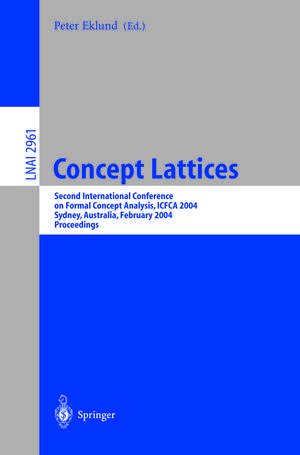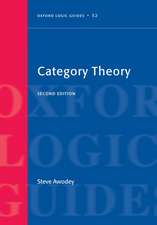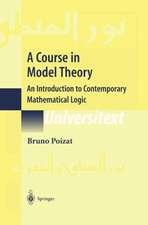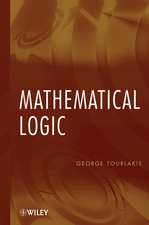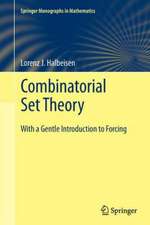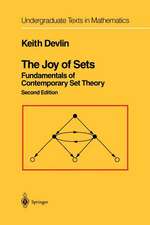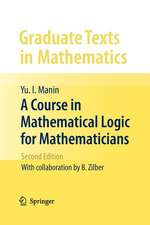Concept Lattices: Second International Conference on Formal Concept Analysis, ICFCA 2004, Sydney, Australia, February 23-26, 2004, Proceedings: Lecture Notes in Computer Science, cartea 2961
Editat de Peter Eklunden Limba Engleză Paperback – 10 feb 2004
Din seria Lecture Notes in Computer Science
- 20%
 Preț: 1061.55 lei
Preț: 1061.55 lei - 20%
 Preț: 307.71 lei
Preț: 307.71 lei - 20%
 Preț: 438.69 lei
Preț: 438.69 lei - 20%
 Preț: 579.30 lei
Preț: 579.30 lei -
 Preț: 410.88 lei
Preț: 410.88 lei - 17%
 Preț: 427.22 lei
Preț: 427.22 lei - 20%
 Preț: 596.46 lei
Preț: 596.46 lei - 15%
 Preț: 448.04 lei
Preț: 448.04 lei - 20%
 Preț: 353.50 lei
Preț: 353.50 lei -
 Preț: 389.49 lei
Preț: 389.49 lei - 20%
 Preț: 309.90 lei
Preț: 309.90 lei - 20%
 Preț: 645.28 lei
Preț: 645.28 lei - 20%
 Preț: 763.23 lei
Preț: 763.23 lei - 15%
 Preț: 580.46 lei
Preț: 580.46 lei - 20%
 Preț: 310.28 lei
Preț: 310.28 lei - 20%
 Preț: 655.02 lei
Preț: 655.02 lei - 20%
 Preț: 1183.14 lei
Preț: 1183.14 lei - 20%
 Preț: 340.32 lei
Preț: 340.32 lei -
 Preț: 449.57 lei
Preț: 449.57 lei - 20%
 Preț: 591.51 lei
Preț: 591.51 lei - 18%
 Preț: 938.83 lei
Preț: 938.83 lei - 20%
 Preț: 337.00 lei
Preț: 337.00 lei - 20%
 Preț: 649.50 lei
Preț: 649.50 lei - 20%
 Preț: 607.40 lei
Preț: 607.40 lei - 20%
 Preț: 1414.79 lei
Preț: 1414.79 lei - 20%
 Preț: 1024.44 lei
Preț: 1024.44 lei - 20%
 Preț: 583.40 lei
Preț: 583.40 lei - 20%
 Preț: 453.32 lei
Preț: 453.32 lei - 20%
 Preț: 575.49 lei
Preț: 575.49 lei - 20%
 Preț: 1075.26 lei
Preț: 1075.26 lei - 20%
 Preț: 585.88 lei
Preț: 585.88 lei - 20%
 Preț: 825.93 lei
Preț: 825.93 lei - 17%
 Preț: 360.20 lei
Preț: 360.20 lei - 20%
 Preț: 763.23 lei
Preț: 763.23 lei - 20%
 Preț: 340.32 lei
Preț: 340.32 lei - 20%
 Preț: 504.58 lei
Preț: 504.58 lei - 20%
 Preț: 369.13 lei
Preț: 369.13 lei - 20%
 Preț: 580.93 lei
Preț: 580.93 lei - 20%
 Preț: 343.62 lei
Preț: 343.62 lei - 20%
 Preț: 350.21 lei
Preț: 350.21 lei - 20%
 Preț: 583.40 lei
Preț: 583.40 lei - 20%
 Preț: 583.40 lei
Preț: 583.40 lei - 15%
 Preț: 438.59 lei
Preț: 438.59 lei - 20%
 Preț: 341.95 lei
Preț: 341.95 lei - 20%
 Preț: 238.01 lei
Preț: 238.01 lei - 20%
 Preț: 538.30 lei
Preț: 538.30 lei
Preț: 395.63 lei
Nou
Puncte Express: 593
Preț estimativ în valută:
75.70€ • 79.05$ • 62.51£
75.70€ • 79.05$ • 62.51£
Carte tipărită la comandă
Livrare economică 15-29 aprilie
Preluare comenzi: 021 569.72.76
Specificații
ISBN-13: 9783540210436
ISBN-10: 3540210431
Pagini: 428
Ilustrații: X, 418 p.
Dimensiuni: 155 x 235 x 22 mm
Greutate: 0.59 kg
Ediția:2004
Editura: Springer Berlin, Heidelberg
Colecția Springer
Seriile Lecture Notes in Computer Science, Lecture Notes in Artificial Intelligence
Locul publicării:Berlin, Heidelberg, Germany
ISBN-10: 3540210431
Pagini: 428
Ilustrații: X, 418 p.
Dimensiuni: 155 x 235 x 22 mm
Greutate: 0.59 kg
Ediția:2004
Editura: Springer Berlin, Heidelberg
Colecția Springer
Seriile Lecture Notes in Computer Science, Lecture Notes in Artificial Intelligence
Locul publicării:Berlin, Heidelberg, Germany
Public țintă
ResearchCuprins
Preconcept Algebras and Generalized Double Boolean Algebras.- Protoconcept Graphs: The Lattice of Conceptual Contents.- Signs and Formal Concepts.- A Mathematical Model for TOSCANA-Systems: Conceptual Data Systems.- BLID: An Application of Logical Information Systems to Bioinformatics.- Formal Concept Analysis: Its Role in Teaching Lattice Theory.- Concept Lattices for Information Visualization: Can Novices Read Line-Diagrams?.- Browsing Search Results via Formal Concept Analysis: Automatic Selection of Attributes.- Formal Concept Analysis and Semantic File Systems.- Numerical Analysis in Conceptual Systems with ToscanaJ.- Tool Support for FCA.- Automated Lattice Drawing.- Congruences of Finite Distributive Concept Algebras.- When Is a Concept Algebra Boolean?.- Background Knowledge in Concept Graphs.- Agreement Contexts in Formal Concept Analysis.- Towards a Conceptual Theory of Indistinguishable Objects.- Conceptual Knowledge Processing with Formal Concept Analysis and Ontologies.- A First Step towards Protoconcept Exploration.- Geometry of Data Tables.- Concept Extensions and Weak Clusters Associated with Multiway Dissimilarity Measures.- Unlocking the Semantics of Roget’s Thesaurus Using Formal Concept Analysis.- FCA in Knowledge Technologies: Experiences and Opportunities.- Applying Formal Concept Analysis to Description Logics.- Machine Learning and Formal Concept Analysis.- A Comparative Study of FCA-Based Supervised Classification Algorithms.- Modelling Tacit Knowledge via Questionnaire Data.- Predicate Invention and the Revision of First-Order Concept Lattices.- The Power of Peircean Algebraic Logic (PAL).- Formal Concept Analysis for Knowledge Discovery and Data Mining: The New Challenges.- AddIntent: A New Incremental Algorithm for Constructing ConceptLattices.- QuDA: Applying Formal Concept Analysis in a Data Mining Environment.- A Parallel Algorithm to Generate Formal Concepts for Large Data.- Using Concept Lattices for Requirements Reconciliation.
Caracteristici
Includes supplementary material: sn.pub/extras
